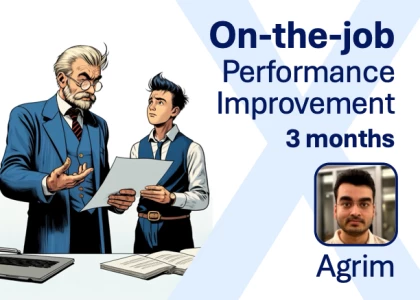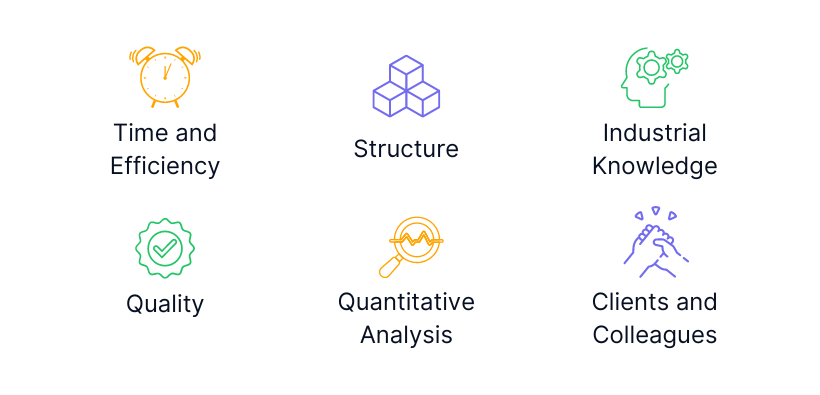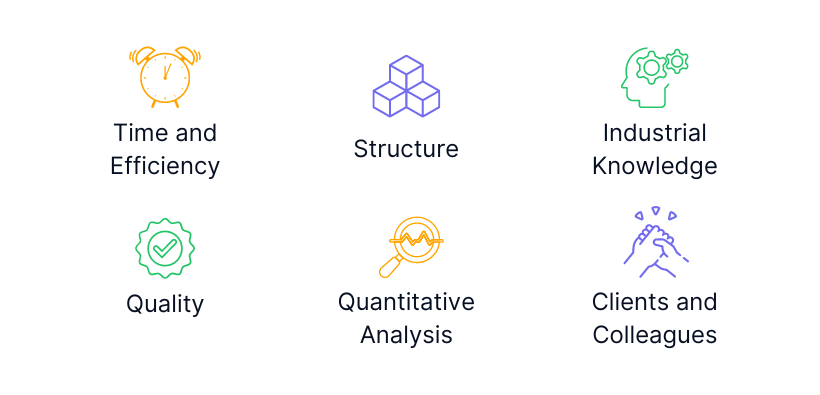Time and Efficiency
This challenge is one of the most prevalent ones amongst consultants and presents itself in multiple shapes and forms – you might resonate with some of these below. If any of these situations resonate with your experiences – expect your appraisal to contain a callout to things like “improving the speed to output” and such:
- Not being able to deliver a slide deck by the promised deadline
- Struggling to create slides at a throwaway speed – that you’ve seen your manager do with elan
- Not being able to finish your working day at a reasonable time and burning the midnight oil regularly
- Always being in a position where you show half-cooked slides to your manager for discussion and then getting feedback that pushes you into re-engineering your work – thus spending more time
- …and some more
The problem typically arises because most people are not accustomed to think with a “hypothesis-driven” mentality and find it out of their comfort zone. Working with a coach can help a lot in developing your hypothesis-driven abilities. When you practice casework with a coach – you are pushed into moving out of your comfort zone to develop your abilities in a safe and supervised space. Improving your hypothesis-driven abilities will eventually help you produce better results faster.
Quality and Detail
Another major performance issue for consultants (especially new ones) is work quality. Consultants often find themselves on the wrong end of a barrage of comments about typos, aesthetics, alignments, colors, and what not. Usually, these problems will show up in your feedback as “attention to detail”, “zero defects”, and more. Here are some symptoms that might resonate with you:
- “I was expecting something more Client-Ready”
- “Can you make it look nicer?”
- “Can you make the alignment of the boxes better – they are not aligned”
- “Oh, there is a double space in that corner of the slide in the footnote”
- “This slide does not look good at all”
- “You need to draw out better insights”
- …and many more
The main reason for all quality and detail challenges is simply poor development of your Consulting Toolkit. While consulting firms often provide training programs to help you build the right Consulting Toolkit – they often are ineffective because they are just lectures and don’t often easily apply to actual project situations. Working with a coach can be highly effective in developing your consulting toolkit because a coach can give you personalized attention and help develop those skills more carefully.
Structure and Brevity
The next popular area of poor performance in consultants is issues with structuring and brevity – across written output, spoken output, and communication output. If you find yourself struggling with any of the issues listed below – then you can expect your appraisal to contain things like “improve conciseness and key messaging” – and more:
- Your manager opining about how you should use lesser words on the slide
- Your manager rewriting your slide titles and slide content
- You are finding yourself rambling and stuttering during key meetings – not being able to sell your work to the manager, partner, and client as effectively as you had imagined in your head while making those slides
- You are finding yourself always second-guessing yourself on what to speak and how to speak – leading to overall declining confidence and its subsequent damaging effects
- You are finding yourself speaking, but not finding your words having the same impact that you expected in your head
The problem typically arises because most poor performing consultants fail to go into the depth of things and often also fail to prepare effectively. This combined with declining confidence – creates a vicious cycle that traps you into the thick of things. Working with a coach is a proven method to improve this performance matter since you can make mistakes in a safe space and are able to rapidly cycle-through and improve your abilities.
Quantitative Analysis
Another major area of performance troubles for consultants is quantitative analysis. Consultants often find themselves facing large excel files and databases – with a multitude of problems as listed below. If any of these have happened to you then expect your appraisal to contain guidance on improving “analytical abilities” or improving the “so-what” – among other things:
- Feeling overwhelmed with numbers
- Struggling to recall and discus numbers related to the case
- Challenges in translating data into actionable recommendations
- Taking a much-longer-than-anticipated time to draw out required analyses
- Difficulty in explaining complex analytical concepts to non-technical stakeholders
- Struggling to understand OR afraid of good quant tools such as Alteryx and Tableau
- Finding it challenging to distill large datasets into the succinctness required for slides
- Difficulty in identifying the best possible graphs and visual aids for quantitative analyses
- Struggling to create robust, adaptable, and scalable excel models that can withstand scrutiny
These issues often stem from a lack of exposure to diverse analytical techniques or insufficient practice with real-world datasets. Working with a coach can provide you with tailored exercises and feedback to sharpen your analytical skills, helping you to not only perform analyses more effectively but also to communicate your findings more impactfully. Practice and familiarity are the only route to good quant skills.
Industrial Knowledge
One of the hallmarks of a generalist consulting role is the expectation from you on getting up-to-speed on cases in no time at all. While this can be challenging as such, it becomes more challenging when the industry of the client is also new for you as the consultant. One project you could be working on automobiles, and then the next case is healthcare – all while you have a background in commerce and accounting. Adaptability in such situations is crucial, but many consultants struggle with it. While industry expertise is not expected from you as a generalist consultant – being good at adapting to new knowledge is a crucial skill that will help you in all other aspects of performance improvement. Some of the challenging aspects in gaining industry knowledge are as follows:
- Difficulty in understanding dynamics and trends of the industry
- Struggling to apply general consulting frameworks to specific industry contexts
- Challenges in speaking the "language" of different industries or functions
- Struggling to actively participate in conversations with the client and partner – who appear better marinated into the thick of things
- Inability to quickly identify and leverage relevant past experiences in new contexts
- Difficulty in connecting disparate pieces of information to form cohesive insights in unfamiliar areas
Reasons for why these issues can occur – are diverse. Perhaps you are just not wired that way – in which case the solution is to create a system around you that helps you navigate the learning curve and create an impression that you are onboarding well. Another possible cause is that you are letting psychology have the better of you – in which case the solution is to develop confidence through structured practice – this letting you feel empowered in any situation and any industry. Any finally, another possible cause is that the industry is in fact “challenging”, and you just need to rough it out in a structured way and keep-up with the bumpy ride.
In every case – one of the best proven methods to improve your performance is to work with a coach to identify what learning techniques are best for your case. A good coach can identify what is your modus operandi and can then help you develop capability to draw from your strengths and understand industries better.
Your Clients
Clients are your ultimate customers in consulting and being able to develop a good working relation is of paramount important. Poor performance in client relationship management can manifest itself mainly in finding it challenging to establish a good working relation with your client counterparts and always being on the backfoot in managing client-expectations.
Poor performance in client relationships is generally driven by your inability to reliably read the client dynamics, their expectations, and what drives the client’s motivation. Often it is also due to the lack of alignment meetings and other such personalized issues. These issues often arise from insufficient experience or a lack of guidance in handling diverse client situations.
In such situations, a coach can provide valuable insights from their own consulting experience, offer role-playing exercises to practice difficult conversations, and help you develop strategies for building stronger client relationships. A coach can also help you develop the right confidence to be able to easily adapt to new clients with ease.
Your Colleagues
Perhaps the biggest challenge for a consultant is within the team itself – your manager and your partner.
Consultants often find themselves struggling to keep pace with the demanding needs from their managers. They are constantly at the wrong end of negative feedback from the managers. They are constantly being micro-managed. And worse – they are always feeling mistrusted from the managers. Such consultants often also receive major comments in their work and must do major revisions and many of them at that.
Simultaneously, consultants often find it a challenging ask to anticipate the needs and asks from partners and often find themselves working till late in the nights to make major last-minute changes that often contribute to their poor work-life balance.
While sometimes your colleagues will be challenging nonetheless, many times it is possible to improve your work conditions by developing a better way of working with your colleagues. This can be very easily done by doing role-play exercises with a coach to simulate a real case environment that can create opportunities for improvement by guided practice.









